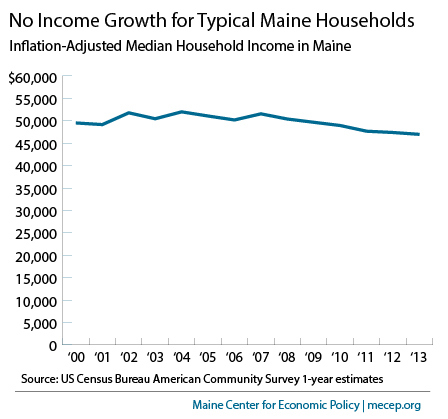Maine median household income is lowest in New England and poverty rate remains significantly higher than during the recession
Augusta, Maine (Thursday, September 18, 2014) New census data reinforces other evidence that more than five years after the end of the Great Recession, the recovery remains elusive for Maine’s working families.
“The lack of improvement in median household income and overall poverty is further evidence that this recovery is leaving too many Maine working families behind,” said Maine Center for Economic Policy (MECEP) economist Joel Johnson. “Maine’s poverty rate remains higher than it was even in the depths of the recession, and incomes for Maine’s working families are down and going nowhere. Real income for Maine’s median household is lower than it was at the bottom of the Great Recession and showing no signs of growth. Income inequality continues to grow, as paychecks for wage earners are no bigger than they were a decade ago.”
The U.S. Census Bureau’s American Community Survey (ACS) released today found that Maine’s median household income and the percentage of Mainers living in poverty were statistically unchanged from 2012 to 2013. Although the poverty rate and median household income estimates changed slightly, the changes were not statistically meaningful, based on the number of households surveyed. In some welcome good news, poverty among children under 18 fell to 17.0% in 2013 from 20.4% in 2012, while poverty among children under 5 fell to 20.4% from 26.9%. ACS findings provide more in-depth analysis of poverty in Maine and across the nation than preliminary findings from the bureau’s Current Population Survey released on Tuesday.
 “Children who grow up in households with income security are more likely to be healthier and more successful in school than kids raised in households struggling to meet their basic needs,” said Maine Children’s Alliance (MCA) executive director Claire Berkowitz. “While the drop in child poverty in today’s report is welcome news, we still have a long way to go. That is why it is so important that the state and federal governments increase our investments to ensure that all Maine children are well fed, see their doctor and their dentist on a regular basis, are safe in their homes and neighborhoods, and attend good schools for the education that will open the door to success when they become adults.”
“Children who grow up in households with income security are more likely to be healthier and more successful in school than kids raised in households struggling to meet their basic needs,” said Maine Children’s Alliance (MCA) executive director Claire Berkowitz. “While the drop in child poverty in today’s report is welcome news, we still have a long way to go. That is why it is so important that the state and federal governments increase our investments to ensure that all Maine children are well fed, see their doctor and their dentist on a regular basis, are safe in their homes and neighborhoods, and attend good schools for the education that will open the door to success when they become adults.”
“Recent state policies have decreased our investments in families and demonized those mired in poverty,” said Maine Equal Justice Partners executive director Sara Gagné-Holmes. “The stagnating poverty numbers that we see today have significant impact on the wellbeing of Maine people and weaken our communities and our economy. The numbers are sobering, and Maine must take steps to change course. MEJP plans to release a new report that contains polling and survey data of Mainers, some of whom live in poverty, along with solutions that will set a course for Maine to move forward by addressing poverty at its core.”


